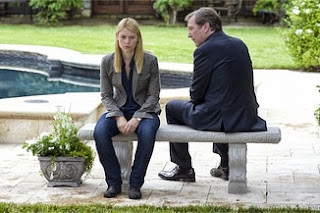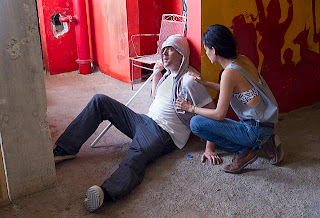“Community” has had such a troubled run. At the same time, it is also more privileged than most shows. Besides multiple hiatuses and threats of cancellation, the show has seen one showrunner get fired and then re-hired. But the loud voices of the Internet spoke, and Dan Harmon’s vision got to beat on.
Category Archives: TV Review
Analog This: Homeland- Run Dana Run
This is a recap of episode four of season three of “Homeland.” The episode is “Game On.”
I have no idea what’s keeping “Homeland” together right now. Each story seems to constitute its own separate show. It’s about time some character came in, “Lost” style, and declared that everybody needs to go back. I’m pretty sure Matthew Fox is actually looking for work.
The one common factor keeping everyone together this season is a feeling of imprisonment. Tonight’s episode is called “Game On” but it feels more like a groan than a game changer. This is the episode where everyone tries to run away. Some found great success (Carrie), while others found themselves walking into yet another trap (Dana).
Speaking of which, let’s talk about Dana. She’s the easiest character to hate on the show. She’s the worst person ever on the whole planet, according to that one person who can’t get people to listen to them unless they are in an Internet comments section. Anyway, I’ve never totally hated the character of Dana. Morgan Saylor did some amazing work two weeks ago when she thought that for once she was completely content. However, if the writers happen to put her in the wrong situation, then she can become grating.
Again, it is the fault of her circumstances, and not Dana personally. This week, Dana and her boyfriend ran away in what seems like an imminent sequel to “Natural Born Killers.” Once again, Dana has another bad boyfriend. She finally thought she found someone as messed up as her, but it turns out she found someone even more messed up than her. I would love if she would just catch a break at this point, but then again, this is a drama.
Meanwhile, Carrie is still in the psych ward. After witnessing the struggle of another female patient, she’s all like “LOL time to go!” Her words, not mine. From this point forward, I am giving up on explaining the plot in a straightforward fashion, because I still am not even sure what just happened. And I don’t mean that in an awesome David Lynch way. This week, everything was both completely figured out and more muddled than ever.
The reason I stick with “Homeland,” no matter what wrong turn it decides to take, is that it is one of the most adventurous shows on television. It always strives to do the thing that you don’t expect it to do. Then, once it backs itself into that incredibly insane corner, it takes Saul’s advice and lets all the pieces fall together. This week, “Homeland” nearly had the puzzle all together. Then, at the last minute, it decided to blow the whole puzzle up and twirl its evil mustache. While there are still multiple stories that need to be connected for “Homeland” to function properly again, it is comforting to know that at least Saul and Carrie are together again. Not like that kind of together though, you sickos.
I still don’t know how I feel about the way in which the show got the two of them back together. At one moment did Saul recruit Carrie as an undercover agent? Did she basically feign insanity and go back into treatment in order to get Saul the information he needed? Saul is right, Carrie is very, very brave. No matter how crazy she might get, or how much money she will steal out of another man’s wallet, Carrie will do whatever it takes to stop the bad guys.
The whole ruse, however, felt like too easy of a fix. It felt more like a convenience than a truly well thought out way to move the show forward. Twists that pull the entire rug out can be good, but they can be problematic if they completely alter the meaning of everything we’ve seen before it. “Homeland” tried really hard this week to pull itself out of neutral. However, it tried just a bit too hard.
Brain Farts From The Edge
- I saw this episode a few days ago so a lot of my notes don’t make sense. I think I’m just going to copy down a bunch of them with no context whatsoever.
- I wrote that the Magician was dressed like Harry Potter in a photo Saul had of him. Makes sense. Harry Potter wore a scarf. Logic.
- I liked the line where Dar Adal compares Carrie to a “full blown contagion.”
- I wrote “WE GET IT” in all caps. Still not sure why.
- I also wrote “Don’t eat the grape!” when Carrie was in Bennett’s house. I just didn’t want her to incur the wrath of the Pale Man.
- This actually seems like a really good time for “Homeland” to be on the air. This season has been about the instability of bureaucracy.
- Brody’s presence was really missed this week. I want more Venezuela.
- Back this week: Mike, Virgil
- Missing this week: Quinn, Chris
- Carrie is on the TSA’s no-fly list. Finally, she has something in common with Abu Nazir.
- The closing credit music is the most consistently good part of “Homeland,” and they took that away, too.
- The problem with plot-centric episodes: Where’s the essence of the characters?
Analog This: Homeland- Tower (Of David) Heist
This is a recap of episode three of season three of “Homeland.” The episode is “Tower Of David.”
Most chatter about “Homeland” nowadays is marked by debate on whether or not the show is good anymore. Rarely have I seen a show fluctuate between great, okay, and horrible so often, and sometimes just within the span of a single episode.
“Tower Of David” is not the best episode in the short history of “Homeland,” but it is definitely one of the most different hours that the show has done. This was the least politically driven episode in a while. To prove how far away it would be going from Washington politics, the episode opened with a sunny beach that might as well have been stolen “Lost” B-Roll. After a bunch of men spoke Spanish (with no subtitles to be found), a bloody and dying Nicholas Brody pops back up. America’s favorite sleeper cell agent is finally back!
Brody has become a former shell of himself. Now bald, he looks like a shriveled up Bruce Willis. He’s been away from the light and loves of his life for far too long. He’s shot for a still unknown reason and brought to a towering, dilapidated building in Caracas. There, he is healed and given a lot of heroin in lieu of, er, traditional painkillers.
Brody’s new home is named the Tower Of David, not in the Biblical sense but rather after the man who died and never finished building it once Venezuela’s economy collapsed. Now, it has become a place for criminals and squatters. Yet, it is a vibrant place in an even more vibrant city. “Homeland” has never stood out for its cinematography, but the contrast between the lively Caracas and the drab bureaucratic institutions that these characters usually inhabit is hard to miss.
The building is captured in a pull away shot which has an incredibly cinematic scope to it. Once again, Brody is trapped. It seems like most of his life has been spent in prisons, whether it be in the Middle East, South America, or his own home. Indeed, the Tower Of David felt a lot like Abu Nazir’s prison: a place that is obviously dangerous, yet Brody is already a little too comfortable in it. Just like with Nazir, Brody is given another young child. Father figure/Stockholm Syndrome part two is about to commence.
The world of “Homeland” already deals with a lot of real establishments, so there is little room for imagination. I would not mind finding out more about the history and people of the Tower Of David though. More backstory seems necessary, as I am still unclear of the intentions of the men who plan to keep Brody safe by holding him hostage. Clearly, they don’t plan on cashing in on the huge reward that’s currently out there for Brody’s head. They know Carrie, so perhaps she hired them to keep him safe?
If Carrie is the mastermind of Brody’s currently situation, she clearly has no more control as she remains institutionalized. Carrie is back on lithium and is losing control of her grip on reality. After cursing him out in a moment of sad triumph last week, Carrie can’t wait any longer for the return of Jewish Santa. However, Saul never shows up. Carrie’s presence seems like a mirror to Brody’s imprisonment. In a strange way, the two of them really are kindred spirits. I think there was more to their attraction than just the element of danger. Still, I think this episode would have been even better as a self-contained hour that was only set in Caracas. The Carrie plot line seemed a little abrupt. The episode I am picturing is a mini television masterpiece. But if I keep trying to write for a different show, then I might as well give up on the version of “Homeland” that actually exists.
Maybe its just that the vivacious and unpredictable new setting was exactly what “Homeland” needed to get its groove back. This is a place where you can get thrown out of a window for stealing something and “keeping the peace” is the justification. Brody is being put under intense psychological torture. Feeling unsafe, he follows Muslim chants and seeks shelter in a Mosque. This solace doesn’t last long before the Tower Of David crew comes in guns blazing and shoots the peaceful Muslims and two police officers who were about to take Brody into custody. When “Homeland,” is at its strongest, it is willing to rewrite its own rules at any time. Neither the characters nor the audience are in a state of complete comfort. For some situations, it is more interesting if there isn’t a political fixer/PR wiz to cover it all up.
For the majority of the episode, Brody remains in the care of the creepy lizard doctor. The doctor seems like the kind of person who would probably conduct some crazy scientific experiment and then try to kill Spider-Man. Anyway, the doctor doesn’t even feel real at times, he feels more like a figment of Brody’s overbearing subconscious. Towards the end, he tells Brody that he is like a “cockroach,” as he is always able to crawl out of disastrous situations completely unscathed. Brody will be there at the end alone, watching the world burn from the slums. Brody has lost his family, his secret lover, and his religion. All he has left to comfort him now is a hypodermic needle filled with heroin. In a short span of time, Brody went from war veteran to junkie fugitive. At its core, “Homeland” will always be a story about tragically flawed heroes and villains.
Brain Farts From The Edge:
- “Tower of David” evoked “City of God” and “Slumdog Millionaire.” Was that just me, or did anybody else think this way? Just need to double check that I’m not racist.
- Most thought provoking quote of the episode: “You are not a Muslim.”
- Seriously, imagine if this whole plot line was completely contained to one episode, kind of like Levi’s rehab stint in “Enlightened”? Guys, I miss “Enlightened.”
- I’m curious as to what Chris Brody’s thoughts are on the lack of HD electronics in the Tower Of David.
- This episode showed a promising turn away from “24″ territory. That means that Dana won’t get chased by a puma anytime soon.
- Occasionally, “Previously on Homeland” can be better than real “Homeland.”
- Maybe something that made this episode so good was that a lot of the weaker minor characters weren’t present.
- Besides the lizard doctor, one could probably make the argument that a lot of this episode took place inside Brody’s head. But let’s not get all conspiracy theory up in here.
- Something I’ve never understood that movie/TV characters do: shouting a certain word repeatedly into a foreigner’s face, hoping that the louder you say it, the better they understand it.
- One of my notes: “Heisenbrody.” Because he’s bald…get it. Guys, I still miss “Breaking Bad.”
- “Homeland” really takes advantage of being on cable. No Jess Brody’s boobs this week, but a lot of bullet being removed from Nicholas Brody’s stomach in graphic detail.
- “When I get frustrated, I take a deep breath and count to ten,” -Nurse to Carrie. Okay, this is the most implausible part of “Homeland” this week. NOBODY CAN GET CALM THAT QUICKLY, LADY!!!!
- Again, subtitles really would have helped this week.
- I like to picture that the lawyer who Carrie talks to has some pretty gnarly bus ads.
- Yes, Brody is a terrorist. But I don’t think I’m alone in feeling some sympathy for him.
- While they make a point that the Tower Of David was not named after the Bible, I could give this story some religious background: America is the Garden Of Eden, and Brody is currently in the exiled land paying for his sins.
Analog This: Trapped, Trapped, Trapped in Orange is the New Black
YOU ARE NOW ENTERING SPOILER TERRITORY
Is TV as we know it dead?????!!!!! Is Netflix the only place we can get good shows now????!!!!!!
No. TV is alive and well and Netflix holds promise as a lead distributor for the future. But I’m not in the future predicting game; I’m in the “Orange is the New Black” fan club. We are few and we are annoying, but we know great television when we see it.
“Orange is the New Black” is based on the true story of Piper Kerman, a waspy shiksa* who ends up in prison for a crime she committed years earlier. The show takes a lot of liberties from there. It starts through the eyes of Piper Chapman (Taylor Schilling) and then expands far and wide, populating the prison with an array of colorful characters. These are the kind of characters who normally aren’t portrayed on television, and they’re often the kind of people you never meet when you’re a sheltered white boy from Connecticut. That’s what good stories are all about: expanding your world and introducing you to the kind of things that your own life might be too short-sighted to ever see.
While watching “Orange is the New Black,” I was reminded of an unlikely companion show: “Lost.” Like that sci-fi drama, “Orange” uses the medium to its fullest extent by leaving its setting through flashbacks. This allows the characters to be more than just their present selves; in prison, you’re not the same person you were on the outside world. In order to understand the new person, it is necessary to also see the old one. Also, if “Orange is the New Black” is “Lost,” does this mean they’re going to start having flash forwards later on? And does that mean Jason Biggs is the smoke monster?
But I digress. “Orange” is the second show created by Jenji Kohan, the first being “Weeds.” If the last few seasons of “Weeds” left a bad taste in your mouth, then consider “Orange” as Kohan’s way of pressing the reset button. This is a brand new world with an episode structure that literally allows endless possibilities.
“Orange is the New Black” is not just that female prison drama. This is a show about people who happen to be prisoners. Emphasis on the people part. That’s why it expands to the characters’ lives outside of prison, so there’s a taste of life outside the prison walls. “Orange” is as much about life in prison as it is about people trying to maintain normality in a very abnormal place.
I wish I did a run through of each episode individually, and tried to cover the little moments that can get lost during binge watching. That will be for another time. So for now, I will try and recap all the best little tidbits of this awesome first season:
The Theme Song: The big debate is whether Regina Spektor’s “You’ve Got Time” was fitting or annoying, or whether the show even needed opening credits at all. Most people were watching episodes in huge chunks so opening credits weren’t necessary. However, they just seem like a staple of television at this point, and they are always a good way to set the mood for the show, and maybe allow some time to recap to yourself what happened in the last episode, as we live in a world where “Previously On…” may be all but irrelevant.
Best Episode: I am tempted to say “Lesbian Request Denied” because of Sophia’s backstory (more on that to come) and the sheer weirdness that is Crazy Eyes. However, I am going to have to go with “The Chickening.” This episode showed the strength of the comedy side of this dramedy, as this episode involved a bunch of prisoners chasing after a mythical chicken they believe is full of drugs. But it also expands the history of the prison and made the relationships between certain prisoners even more complex (specifically that of mother and daughter pair Aleida and Daya Diaz). Then, it ends at a moment so surreal that it begs you to immediately watch the next episode, regardless of whether the chicken mystery will ever be solved.
Most Interesting Backstory: Sophia. It is so rare to see a transexual character on television (besides Mrs. Garrison on “South Park,” of course), so seeing one as a major player on “Orange is the New Black” was so refreshing. Sophia’s backstory explored the consequences of such a major decision in such a deep, funny, and sad way. I couldn’t stop thinking about it for days. It was this episode that assured me that “Orange is the New Black” is not just some female prison drama.
Craziest Revelation: Pennsatucky became a Jesus freak after murdering a nurse in an abortion clinic and inadvertently becoming a martyr. However, this was not an act of fundamentalism but rather simple craziness. Maybe you should be less judgmental of Piper’s lack of faith, Miss Five Abortions.
Greatest Character Redemption: “Crazy Eyes” Suzanne. Suzanne scared me in the first few episodes as much as she scared poor Piper. Yet, a funny thing happened towards the end of the season: Suzanne got a chance to really talk. Turns out she may be disturbed but she’s also an incredibly kind person. I am excited to see more of her next season. She seems to have her crazy eyes more open to what’s really going on in the prison than most people there.
Greatest Backwards Character Redemption: Healy. Healy was my favorite character in the beginning. He seemed like an honest guy who wanted nothing more than to help Piper and collect Corgi bobble heads. But it turns out he’s kind of a jerk. And he’s really bad at his job. Then in the last episode, he walks away as Piper is close to death. In a show filled with some very dangerous prisoners, the guard is the villain.
Funniest Moment: The inmates bond while watching “Good Luck Chuck.” It’s actually a very sweet scene about escapism and the healing power of laughter, all while watching a Dane Cook movie. But hey, I guess that was the best that Litchfield prison could do. Also, if I were in prison, I would probably be okay with any comedy that I could get.
Funniest Jewish Moment: Oh man, is Jenji Kohan good at these. The tiny detail that Yoga Jones hung a dreidel up backwards is funny. Yet, I will have to go with episode one for this one: Larry’s mother taking up his phone time with Piper with a string of neverending questions was perfect.
Funniest Irony: John Bennett is a war veteran and seemingly the most genuine guard at Litchfield. However, his amputated leg came not from war, but rather from an infection from a hot tub in Orlando. Does anyone else find this funny? Or am I just a bad person?
Pornstache: I believe Mendez deserves his own category. No matter how creepy he got he was always such a joy to watch. The moment that got me is when he did inspection while humming “Pomp and Circumstance.” No matter how pervy he got, maybe I could always find sympathy because he really did care about his job. But mainly it’s because Pablo Schreiber is such a fantastic actor. He made Mendez so consistently creepy. Here’s hoping he lands an Emmy next year.
Corruption Off!: “Orange” also covers the lives of those who run the prison, each one of them a little more corrupt than the last. Strangely, authority often seems more like the bad guy than the prisoners themselves. I think nearly everyone working there would let someone die (which happened) if it was in their best interest. Except for Luscheck (Matt Peters). He just always looks like he just wants to go to sleep.
Weirdest Sex Act: Big Boo. That screwdriver. No further explanation necessary.
Best Character with no lines: Big Boo’s dog. Because of course.
Saddest Moment: Miss Claudette (Michelle Hurst) is denied parole and the chance to be reunited with her long lost love. Some bad behavior lands her in the SHU. As she’s escorted down she says “I don’t care anymore.” In a show that humanizes all of the prisoners and offers many deserved moments of redemption, this moment was unexpected and heartbreaking.
Saddest Trombone: Joe Caputo (Nick Sandow), who mainly seemed liked a spineless bureaucrat who couldn’t get up without a stick in his butt, finally showed some humanity when he offered Susan Fischer (Lauren Lapkus) a bouquet of flowers. She followed the nice gesture by introducing Joe to her boyfriend. Just when it seemed like he had a victory. Womp womp.
“Kill Bill”-iest Moment: Piper beating the ever living crap out of Pennsatucky in the snow.
What I want to see next season: How Red landed in prison, how Daya landed in prison, Healy’s backstory, Yoga’s backstory (even though she already described it), where the hell that chicken is
And finally…the moment my childhood ended: Laura Prepon. Naked in a shower. Goodbye, Donna.
*I know this sounds offensive, but its just so fitting for this show. Also, that’s how Terry Gross described her on Fresh Air. Terry Gross knows all.

Breaking Bad: TV Just Got Really Good
“Breaking Bad” has been labeled the best drama on television by most people who have ever watched it. It lives up to that honor. Its distinctive style leaves an unforgettable mark.
Walter White, played with a ferociously calm zeal by Bryan Cranston, is a high school chemistry teacher in Albuquerque. As the show begins, life isn’t too great for Walt. He works a job well below his level of brilliance, and can barely support his pregnant wife Skyler (Anna Gunn) and his crippled son Walter Jr. (RJ Mitte).
Walt is diagnosed with terminal lung cancer. Realizing he may not be around much longer, he decides to find a way to leave money for his family. In an act of desperation, he teams up with Jesse (Aaron Paul), a junkie former student of his a heart of gold, in order to cook meth. Using his extensive knowledge of chemistry, Walt cooks up the best meth anyone north or south of the border has ever seen. He becomes rich, but he also enters a world far more dangerous than he ever could have imagined.
As I’ve said before, AMC has the potential to be the best network on television, if not for all of the f***ing bleeps. “Breaking Bad” achieves a cinematic level of storytelling. As the show unfolds, it feels more and more like everything was planned right from the start.
“Breaking Bad” seamlessly blurs the line between good and evil. The show’s title comes from a southern colloquialism describing a straight-edged person who has taken a turn for the worse. “Breaking Bad” might be a show about dangerous criminals and drug deals but it will always boil down to the devastating downward spiral of Walter and how his decisions lead to the deterioration of his relationship with his family, the only thing in the world he cares about.
As Walter, Cranston gives the best dramatic performance on television. He can convey a feeling simply by giving you a long, frightening glare. He makes Walter’s moral descent totally believable. In one episode, Walter’s family tries to give him an intervention. It is a prime example of both Cranston’s work and the show’s powerhouse writing. In addition, Paul surprises as Walt’s partner-in-crime. Sometimes, he seems dumb and emotionally empty. But then he does something like save a child from his meth addicted parents. In a show filled with morally hazy actions, this was one of the few things someone on “Breaking Bad” does that can actually be described as heroic.
“Breaking Bad” is a modern western in the spirit of “No Country for Old Men,” in which the characters inhabit the cowboy morale in a present day setting. It also seamlessly mixes in elements of a thriller, with many episodes echoing the atmospheric horror of “The Shining.” In short, creator Vince Gilligan is an auteur of television.
A single episode of “Breaking Bad” is kind of like a movie in itself. However, the format of television allows the story arcs and the characters to run even deeper than most movies ever do. “Breaking Bad,” along with shows like “Mad Men” and “Louie” has figured out what the filmmakers of the late 60s figured out: how to make the medium raw, original, and real. Television creators are starting to develop distinctive styles. “Breaking Bad” represents good television moving beyond the big four stations. And no matter what anyone will say, there is still a place in the world for stories as good as “Breaking Bad.”
 During the first episode of “Breaking Bad,” Walter White tells his class of less-than-eager students that chemistry is not the study of chemicals, but rather the study of change. If chemistry is the study of change, then Walter is a study of how quickly a person can change. And his descent is more alarming than any chemical reaction you’ll ever experiment with.
During the first episode of “Breaking Bad,” Walter White tells his class of less-than-eager students that chemistry is not the study of chemicals, but rather the study of change. If chemistry is the study of change, then Walter is a study of how quickly a person can change. And his descent is more alarming than any chemical reaction you’ll ever experiment with.


Mad Men: Dissertation on the Best Season Yet
 Warning: Spoilers for the fourth season ahead. Proceed with caution.
Warning: Spoilers for the fourth season ahead. Proceed with caution.

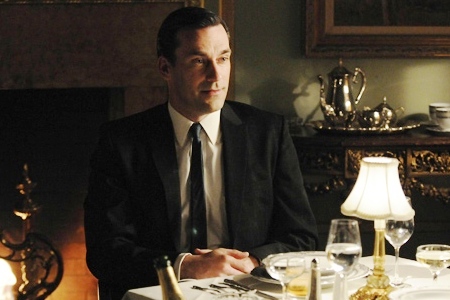

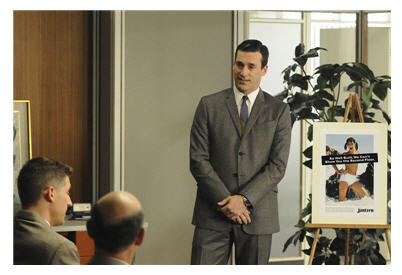

TV Review: Skins

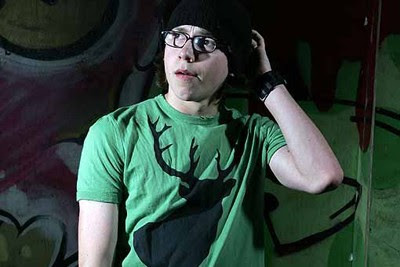
TV Review: Modern Family
 I’m so sorry. I feel like I’ve committed a crime.
I’m so sorry. I feel like I’ve committed a crime.


It’s Always Sunny in Philadelphia Season 5 Premiere: Foreclosures, Octomom, and Hummingbirds
 I guess it makes sense that “It’s Always Sunny in Philadelphia” would begin a new season with a pointless conversation about whether or not it’s illegal to own a hummingbird. After all, it’s not like they have anything valuable they could be giving back to society.
I guess it makes sense that “It’s Always Sunny in Philadelphia” would begin a new season with a pointless conversation about whether or not it’s illegal to own a hummingbird. After all, it’s not like they have anything valuable they could be giving back to society.
TV Review: How I Met Your Mother
The traditional sitcom is not dead yet. No, it has been reborn–maybe only for a brief moment, but it certainly is npt yet dead. What the traditional sitcom needed was a shot of unconventionality, a shot “How I Met Your Mother” was able to deliver.


